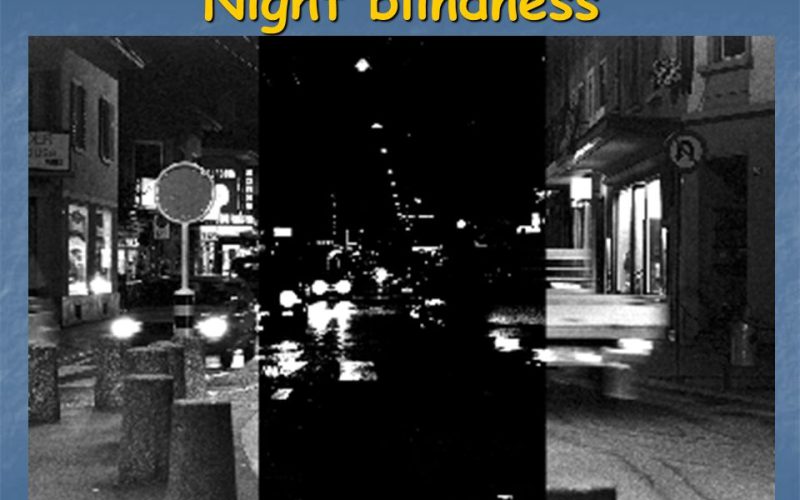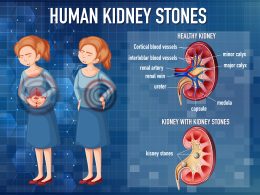Introduction:
The silent struggle with Night Blindness problems affects millions of individuals across the United States. From the seemingly mundane need for glasses to more intricate issues such as cataracts, retinitis pigmentosa, and diabetes-related complications, understanding the underlying causes is essential. This article navigates through the labyrinth of night vision challenges, shedding light on their diverse origins and the varied treatment landscape.
Causes of Night Vision Problems:
- Cataracts:
- Understanding Cataracts: A gradual clouding of the eye’s lens, a natural consequence of aging.
- Insight into Symptoms: Worsening night vision, halos around lights, and general blurriness.
- Treatment Approach: Surgical removal of cataracts with the insertion of a clear artificial lens.
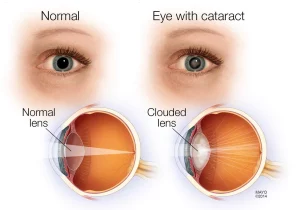
- Vitamin Deficiencies:
- Vitamin A’s Vital Role: This essential nutrient, abundant in carrots and leafy greens, is crucial for maintaining a healthy retina.
- Zinc’s Synergistic Effect: Zinc enhances the efficacy of vitamin A, and its deficiency may lead to night blindness.
- Holistic Treatment: A balanced diet rich in vitamin A and zinc can contribute to better night vision.

- Retinitis Pigmentosa:
- Rare Genetic Intricacies: A genetic disorder predominantly affecting young individuals, often before the age of 30.
- Night Vision Decline: A decline in night vision often serves as the earliest symptom, with outcomes ranging from partial to complete vision loss.

- Sunlight Exposure:
- Unveiling the Risk: Prolonged exposure to sunlight emerges as a significant risk factor for cataract development.
- Preventive Measures: Consistent use of sunglasses outdoors becomes imperative to shield the eyes from potential sun damage.
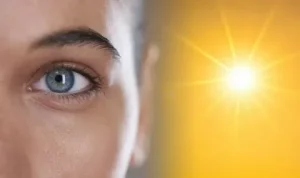
- LASIK Surgery Complications:
- Navigating Post-Surgery Issues: While LASIK complications are uncommon, some individuals may experience night vision problems.
- Symptoms and Considerations: Glare and halos around objects, particularly noticeable at night, necessitate careful assessment before opting for LASIK surgery.
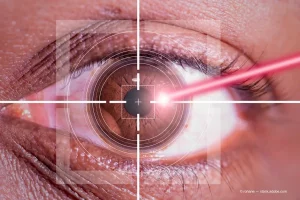
- Diabetes and Night Vision:
- Insidious Impact: Diabetes heightens the likelihood of night vision problems over time.
- Retinopathy’s Connection: Prolonged exposure to high blood sugar damages blood vessels and nerves, leading to retinopathy.
- Management Strategies: Tight control of blood sugar levels through medications and diet is paramount.
Diagnosis:
The journey towards addressing night blindness commences with a comprehensive diagnosis. A visit to the eye doctor involves a simple yet revealing examination. The dilation of the eyes with drops allows for a thorough examination using a slit-lamp, providing insights into the root cause of the issue.
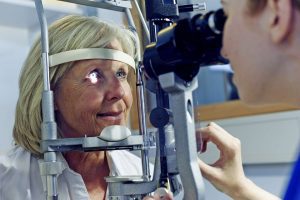
Treatment Options:
- Cataracts:
- Surgical Intervention: The gold standard for cataracts involves their surgical removal, with the insertion of an intraocular lens.
- Post-Procedure Vision: While many experience improved vision post-surgery, some may still require glasses for optimal sight.
- Diabetic Retinopathy:
- Preventive Measures: Tight control of blood sugar levels emerges as a crucial preventive strategy.
- Laser Therapy Intervention: Panretinal photocoagulation, a laser therapy, helps preserve overall sight while potentially impacting night vision.
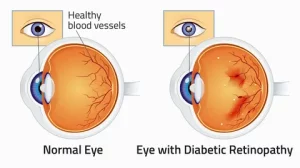
- Vitamin Deficiencies:
- Dietary Considerations: While vitamin A and zinc deficiencies are not common causes, maintaining a diet rich in these nutrients can contribute to overall eye health.
Comparative Table:
| Causes | Symptoms | Treatment |
|---|---|---|
| Cataracts | Worsening night vision, halos, blurry vision | Surgical removal, artificial lens, possible glasses |
| Vitamin Deficiencies | Vision issues, especially in low light | Balanced diet rich in vitamin A and zinc |
| Retinitis Pigmentosa | Decline in night vision, potential loss of sight | Varied outcomes, some retain partial vision |
| Sunlight Exposure | Increased cataract risk | Prevention through sunglasses, eye protection |
| LASIK Complications | Glare, halos, distortion of vision | Risk assessment before surgery, consultation with doctor |
| Diabetes | Difficulty seeing in low light | Tight control of blood sugar, medical management |
Conclusion:
In the intricate realm of night vision problems, knowledge is the key to effective treatment. Whether addressing cataracts, genetic disorders, Treatment for other Health Problems or diabetes-related complications, prompt attention and a tailored approach can significantly enhance nocturnal sight. Consultation with healthcare professionals remains paramount for personalized guidance on managing and overcoming night vision challenges.






